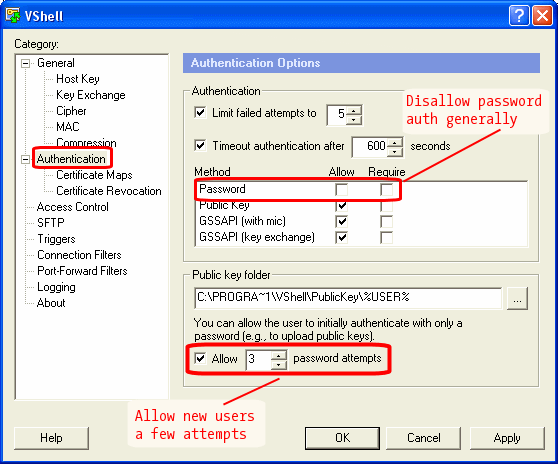

- #SECURECRT PUBLIC KEY INSTALL#
- #SECURECRT PUBLIC KEY UPGRADE#
- #SECURECRT PUBLIC KEY PASSWORD#
- #SECURECRT PUBLIC KEY PLUS#
Next, you are prompted to enter a passphrase twice (I leave it blank, but you should use something pretty long phrase, that you’re going to remember):

Select RSA as the Key Type and click “ Next“: To create a public/private key pair in SecureCRT, open up SecureCRT, click on “ Quick Connect“, from there click on the “ Properties“:Ĭlick “ Create Identity File…” and the key generation wizard starts: In this tutorial, I’ll try to show you the steps that you need to create public/private key using SecureCRT and use it with Ubuntu Server.
#SECURECRT PUBLIC KEY PASSWORD#
So.Public-key authentication is a proven, it’s better then allowing password authentication.As long as you keep your private key file safe, you’re less likely to encounter a break-in of your Unix/Linux servers. I've reprioritised Host Key algorithms in SecureCRT (attachment) and now, not getting changed changed host key warning. However, it seems SecureCRT, by default, uses RSA and complains about "SHA-2 hash base64: 3D0pNjuaODGYrjRJLSsWDWgscA7hZAV8Q/7BNpbgEuA". So, ED25519 fingerprint stays same, but RSA changes. Those Host key algorithms can be see in "ssh -vvvv" attempts, so, it's obvious that (cygwin) ssh is offering them at handshake, but Fortigate takes offense. Their offer: ecdsa-sha2-nistp256,ecdsa-sha2-nistp384,ecdsa-sha2-nistp521." X.Y" port=0 msg="Negotiation failed: no matching host key type found. Well, something that is weird is - I keep receiving Alertemails like this - I never received them in 6.0.12:ĭate= time=14:22:55 devname= obfuscated devid= obfuscated eventtime=1619238175542759375 tz="+1000" logid="0100032247" type="event" subtype="system" level="error" vd="root" logdesc="SSH protocol cannot be negotiated" addr="192.168. Those two matched exactly what "ssh-keyscan 10.0.0.1 | ssh-keygen -lf -" shows, so, there's nothing "weird" except that the RSA one changes after reload or power cycle. SSH: notify_hostkeys: key 1: ssh-ed25519 SHA256:q7S3RT/EhTxfxfXyDdx95KNCBOMdork/PdYovXpcv9g SSH: notify_hostkeys: key 0: ssh-rsa SHA256:21R3QR7eg9ffOjWUTrgKHDnHdIXTO5F9gS5lb0Op4BY I've previously done "diagnose debug application sshd -1" - this is what I saw: We've already established that ED25519 doesn't change, so, using FortiOS 'execute ssh' which only uses this Host Key type won't show anything pertaining to RSA. I would also check a few other ssh-clients. You can always debug from the fortigate side of things also to see if sshd is doing anything weird. Warning: Permanently added ':2022' (ED25519) to the list of known password: * not I'm running ssh on port 2022 in my setup */ The only way that I'm aware of a new key being loaded to known_hosts, if the ip_address changes or you add a new address or you ssh into a new address "Warning: Permanently added ':2022' (ED25519) to the list of known hosts."Īlso are you running any special task jobs that will regen-key ? or running in FIPS mode ? which should not do any key-regeneration by it's self.Īnd fwiw, I'm running maybe 2 fgts on 6.4.3 and 5 on 6.4.4 none on 6.4.5.
#SECURECRT PUBLIC KEY UPGRADE#
The below should come up only once until you manually delete the keys or upgrade the fortios So do this, login into the fgt and use the local-ssh client integrated into fortiosĮ.g execute ssh the fortios store the host fringerprint, and redo the same command after logging out and back in, did it show you a new permanently adding key to known_host No the RSA key should not change unless MiTM is going on. My feeling is that if you suffer a man-in-the-middle attack between you and your default gateway, there are far deeper security problems on the network than dealing with SSH host keys. I have a simple grab-the-config script that runs to my 60F every night, and I use "-o StrictHostKe圜hecking=no" on the "scp" command line to automatically add the host keys. Some packages that do automatic collection of networking gear configs - such as the miserable but versatile RANCID - script "accept new host key" as part of their connection chitchat, so many have decided this is just not that much of a risk even though it sounds sub-awesome.
#SECURECRT PUBLIC KEY PLUS#
If that fixed host key is floating around outside the Fortigate it's subject to compromise, and that seems sub-awesome plus a maintenance challenge.
#SECURECRT PUBLIC KEY INSTALL#
I have been ssh'ing into Fortigates - including HA pairs - for a long time and don't remember running into the host key changing other than after major software upgrades.Īnd though I can kind of understand why you'd want to install a fixed host key in each machine just to make automation easier, I'm trying to figure out if this actually makes you any more secure.


 0 kommentar(er)
0 kommentar(er)
